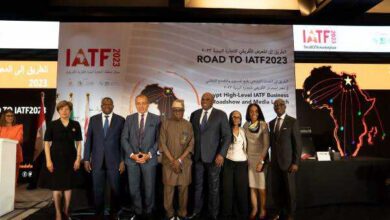CBN’s promises to exporters, importers and matters arising

BY JONHMARK UKOKO
The Central Bank of Nigeria (CBN) surely knows how to rollout lofty policies and promises to Nigerian exporters, importers and business generally. The bank is also quick to assure beneficiaries of its readiness to ensure the policy workout as planned, however, years after many of the apex bank’s policies, interventions and programmes do not
appear to be successful as envisaged by the bank, writes JOHNMARK UKOKO.
Recently, the Central Bank of Nigeria (CBN) announced its new initiative named CBN $200 billion through RT 200 designed to boost non-oil exports in the country. It also promised that it has made provision for $ 200 billion foreign exchange (forex) in the next three to five years to boost non-oil exports by local companies. Governor of CBN, Godwin Emefiele, who announced the new initiative at the end of the last Bankers Committee Meeting (BCM), in Abuja about two weeks ago, said under the programme, the apex bank, working with the country’s Money Deposit Banks (MDBs), will fund the construction of the dedicated non-oil export terminals to eliminate the delay currently being experienced by exporters.
It expressed the hope that the policy, would provide loans to companies for value addition and production of finished goods for export at five per cent for 10 years period with two years of moratorium. The apex bank said other key features of the programme included non-oil commodities expansion facility and expressed optimism that the new policy would go a long way to fetch the country huge foreign exchange earnings from the non-oil sector. Also through this new CBN’s initiative, local companies would meet their forex needs. Speaking further on his bank’s new policy, Emefiele stressed that rather than for local exporters to export cocoa with minimal export proceeds,
the apex bank would fund companies to produce chocolate in the country. He also give another instance, saying: “Instead for the cashew exporters to export raw cashews, they will be encouraged to process them
before exporting them for better income for the companies and the country.”
In the surface, the new CBN’s policy is a welcome development and long overdue, but the questions begging for answer are whether the apex bank did its due diligence properly and whether local exporters, the Manufacturers Association of Nigeria (MAN) and other stakeholders were duly consulted before the CBN made the policy public? While it may be quite difficult to know the level of consultation the apex bank did, one thing is certain, which is the fact that some economists and experts have their own reservations about the policy.
One of such experts, who have criticised the new policy is the Chief Executive Officer (CEO) of the Centre for Private Enterprise (CPE), Dr. Muda Yusuf, who had argued that while the policy looked good in the face value, its implementation, like most policies in the country, will be a different matter all together. He said the success or otherwise of the policy depends on its implementation, stressing that when the policy commences, the stakeholders for whom the policy is meant will understand how good or bad the policy will turn out to be, saying that only time will tell of its efficacy.
He opined that in the past CBN initiated lofty policies, but were poorly implemented, which led to their failure. An exporter of palm kennels, Jude Ofoge, said the policy is still under study by local exporters, adding that it was still too early to comment on the policy. Speaking on a telephone interview with The Trumpet, Ofoge said he and
his colleagues were still studying the new policy, adding: “I only read about the CBN RT $200 billion policy to stimulate non-oil export in the next three to five years in the newspapers.
“Sincerely speaking, I don’t know how the policy will work out for non-oil exporters. I hope the policy will be well implemented to achieve the desired results for the country’s non-oil exporters.” When contacted to share his views on the policy, Director General of the Manufacturers Association of Nigeria (MAN), Segun Ajayi-Kadir, could
not respond to calls made to his telephone line before going to the press.
However, others who responded to the new initiative said the CBN under Godwin Emefiele had initiated policies that have failed woefully. They listed the policy on the ban of the Bureau de Change (BDCs) from the official forex widow as the solution to the country’s FX challenge, which he said, had failed to strengthen the Naira. They also cited the allegation that the daily publication of FX rate against Naira by the AbokiFX as the reason why Naira has been on the free fall, as another policy the CBN got wrong, insisting that AbokiFX has stopped the publication of the FX rate, yet the Naira continues to decline in value.
They also listed the N500 billion COVID-19 intervention policy to the various sectors, which MAN and many local manufacturers confirmed that they did not know the beneficiaries and other policies Enefiele and the CBN team have failed to deliver to the intended beneficiaries years after.
The CBN has announced the new policy, but the next three to five years the CBN fixed to expand the $ 200 billion will determine if the policy will succeed or fail like many other past policies under the current CBN governor. Only time will tell how the policy will pan out.




